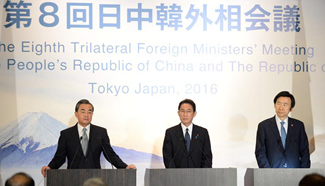by Edgardo Loguercio
BRASILIA, Aug. 24 (Xinhua) -- As next week's impeachment trial for Brazil's suspended president Dilma Rousseff nears, political observers are looking beyond to what they see as a new chapter of opportunities.
The problem, as many see it, is that Rousseff's undecided state and her replacement's temporary status is holding the country back.
At the trial, Brazil's Senate is widely expected to impeach Rousseff, of the left-leaning Workers' Party (PT), and fully instate now interim president Michel Temer, of the pro-business Brazilian Democratic Movement (PMDB).
David Fleischer, professor of Political Science at the University of Brasilia (UnB), said the trial's end will finally allow Temer to take up the reins and carry out tough economic reforms to jump start the sluggish economy.
"This political party (PMDB) should serve to impose austerity measures," said Fleischer, though he added it won't be easy.
"It's complicated, because the deputies (in Congress) aren't willing to limit spending, and that's the nature of politicians. But he (Temer) is presenting it as quite serious, because if you want to attract the private sector to invest again and to believe in the government, you have to take pretty tough measures," Fleischer told Xinhua.
The first task the government must tackle is to control ballooning social security spending, he said.
"The social security deficit is growing like a tsunami (and) that could ruin the social benefits of a lot of people. In 10 or 15 years there won't be any more funds for people to retire. That needs to be attended to for future generations," said Fleischer.
When it comes to the economy, whichever way the Senate votes on impeachment next week will help give the country direction, economist Jose Luiz Pagnussat, a professor at National School of Public Management (ENAP), told Xinhua.
"Since the tendency is towards impeachment, the expectation is that the optimism of economic agents and indicators of confidence will improve. That points to greater investment once the impeachment is confirmed," said Pagnussat.
A boost in investment, in turn, should help spur the economic recovery, a trend economists say is already being felt.
"Temer has pledged to implement reforms to expand alliances with the private sector (and) that tends to encourage investment in infrastructure and the flow of international capital," added Pagnussat.
The downside, he said, could be that any belt-tightening "might negatively impact health and social security policies," but if austerity measures lead to economic growth, that would compensate by generating jobs.
"We lost 10 years of decreasing unemployment in less than two years," the economist lamented, noting Brazil's unemployment rate reached a low of 4.5 percent in December 2014 before spiking to more than 10 percent today, due to the economic slowdown.
Fleischer agreed the government's priority should be to reduce unemployment, as well as inflation and the interest rate.
"There may be a little social unrest (sparked by austerity), but Temer has already said some painful reforms need to be made, because the state cannot spend more than it takes in," said Fleischer.
Will Brazil's workers' unions and social organizations -- which have strong ties to Rousseff's Workers' Party -- be as willing to make the sacrifices the government feels are necessary?
"There are signs that they are going to sit at the negotiating table," said Fleisher. "The CUT (Unified Workers' Central, Brazil's leading national trade union) refused to sit at the negotiating table with Temer's government, but today it is talking. Negotiation is the solution."










